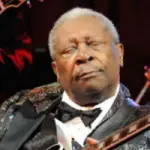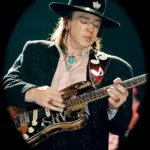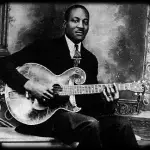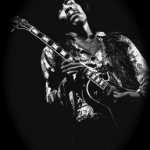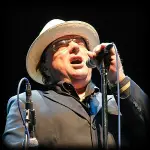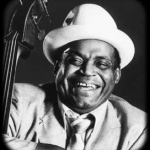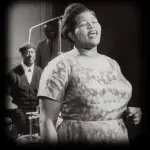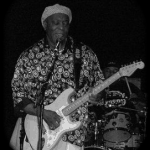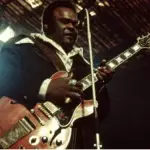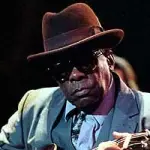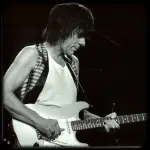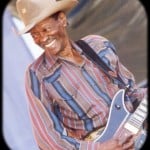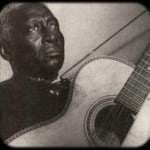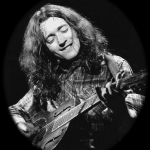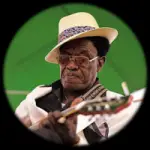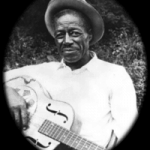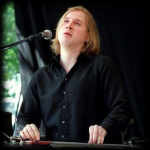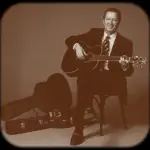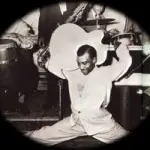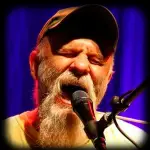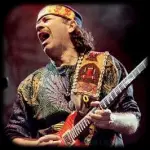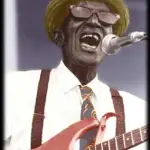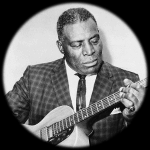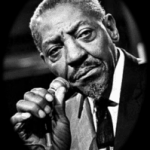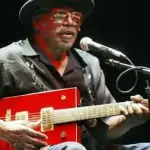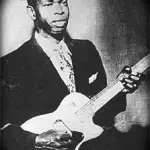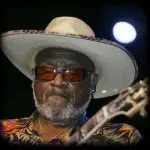The Blues is full of larger-than-life characters and these thumbnail facts are meant to give a flavour of the person behind the name. They sometimes expose the quirky side to a personality or an interest outside their musical career, and they will often miss out the most interesting, important and well known facts about an artist.
If these snippets arouse your curiosity, you should click the photo or title to fuller biographies, which have much more detail, as well as music, photos, video and album recommendations.
- BB sang with The St. John Gospel Choir when he was 16.
- He wrote to radio DJ Sonny Boy Williamson II asking to play on his show. BB played one song and got a residency in Memphis and a Peptico advert!
- At a juke-joint gig, two men fought over a woman called Lucille, and the joint went up when they turned over the stove. BB rushed into the inferno to rescue his guitar, and from that day onwards his beautiful Gibson ES was always called 'Lucille'.
- BB has collected 16 Grammy Awards, countless Blues awards, two Honorary Doctorates and the Presidential Medal of Freedom.
Stevie Ray Vaughan
- Stevie Ray quit school at 16 and moved to Austin, Texas following in the footsteps of his guitar playing big brother Jimmie.
- This video shows Stevie Ray and Double Trouble playing the 1982 Montreux Festival as an unsigned band. Offered free studio time by Jackson Browne, they recorded 'Texas Flood' in three days.
- Texas Flood sold over 500,000 copies in The States, and put Blues Rock back into the spotlight.
- Stevie Ray earned six Grammys, becoming world star and a genuine 'guitar hero'.
- In 1990, minutes after appearing onstage with Buddy Guy, Eric Clapton, Robert Cray and his brother Jimmie Vaughan, Stevie Ray was killed in a helicopter crash in Wisconsin.
Big Bill Broonzy
- William Broonzy was born on the banks of the Mississippi in 1893, one of 17 children.
- In Chicago, Big Bill often played guitar with his half-brother Washboard Sam and pianist Black Bob Hudson in an early Blues Band.
- Many of Big Bill's records in the 30s often had drums, bass and horns, as The Blues became a sophisticated urban music.
- The 1938 'Spirituals to Swing' concert at Carnegie Hall, brought Big Bill's music to a white audience for the first time.
- His nationwide series of concerts and many European tours in the 50s opened a lot of people's ears to The Blues.
Jimi Hendrix
- Jimi started out playing guitar on the 'chitlin circuit', backing acts like Little Richard and The Isley Brothers.
- He moved to New York, and in 1966 was offered the chance of a new career in London.
- 'Hey Joe' was a British Top Ten pop hit, and when Jimi appeared on TV he got sensational revues.
- His use of feedback and wah-wah, and his awesome technique impressed Eric Clapton, the entire British Blues community, and then the whole world.
- Jimi only made three studio albums; Are You Experienced?; Axis Bold as Love; and Electric Ladyland, but much more material has been released by The Experience Hendrix Organisation.
- Jimi's 'Star Spangled Banner' at Woodstock was a wordless tribute to the Vietnam Generation, the eternal voice of disenfranchised youth, and a fitting epitaph to a great man.
Van Morrison
- George Ivan 'Van' Morrison was born in Belfast, Ireland in 1945.
- His band 'Them' had a big hit in 1964 with a version of Big Joe Williams' 'Baby Please Don't Go', with Van's song 'Gloria' on the flip-side.
- In 1967, Van went solo and his song 'Brown Eyed Girl' was a Top Ten hit in the Hot 100.
- Later 'Van the Man' virtually created 'Celtic Soul' with his monster albums including 'Moondance' and 'Wavelength'.
- Despite winning six Grammys, Van does not pursue commercial success, but is more interested in exploring the spirituality of music. He was awarded a Knighthood in 2015, so now he's 'Sir Van'.
Willie Dixon
- When Willie moved from Mississippi to Chicago, it wasn't to play the Blues: he was a boxer, and became Heavyweight Champ of Illinois.
- Willie was hired by Chess Records as a producer, arranger and studio manager, as well as a bass player.
- His talent for songwriting provided big hits for Muddy Waters, Howlin' Wolf, Little Walter, Bo Diddley, and many more.
- After touring Europe with The American Blues Festival, Willie became their agent in the USA, booking artists for future tours.
- After suing Led Zeppelin for stealing his work, Willie used the money to start the Blues Heaven Foundation, to help Bluesmen get their royalty checks.
Big Mama Thornton
- Willie Mae Thornton started out as a 14-year-old singer with The Harlem Hot Revue.
- Her version of 'Hound Dog' was the biggest selling R&B record of 1953.
- In 1954, she was backstage at a Christmas Show in Houston when a drunken Johnny Ace was waving a loaded pistol around, and shot his own brains out!
- Big Mama cut an album in London with Muddy Waters on a 1963 European tour.
- Her own song 'Ball & Chain' was the title track on her 1968 album, and she didn't even get paid royalties when it became Janis Joplin's iconic record.
- In 1984, Big Mama passed away alone in a Los Angeles rooming house.
Buddy Guy
- Young Buddy set out to emulate his hero Guitar Slim, who he saw in the clubs of Baton Rouge.
- When he moved to Chicago in 1957, he won a 'Battle of the Blues' at The Blue Flame Club, beating Magic Sam and Otis Rush.
- Willie Dixon took Buddy under his wing at Cobra Records, and took him to Chess as a solo star and session man.
- He appeared on Junior Wells' 1965 'Hoodoo Man' album, billed as 'Friendly Chap', and started a partnership that lasted over 30 years.
- Buddy opened Eric Clapton's '24 Nights at The Albert Hall', and played at several of his Crossroads Guitar Festivals.
- Buddy persuaded President Obama to sing 'Sweet Home Chicago' at a White House Blues show.
Freddie King
- Freddie Christian was born in Texas in 1934, but took his Mama's 'maiden-name' of King when they relocated to Chicago.
- He was on of the 'young guns' whose spiky guitar style and impassioned vocals were typical of the 'West Side Sound'.
- Freddie's biggest hit, 'Hide-away' was named after one of the most popular bars in Chicago.
- In the 60s, Freddie's playing was a big influence on young British Blues players like Eric Clapton, Stan Webb and Peter Green.
- Shortly after touring Europe, Australia and The States in 1976, Freddie passed away from heart-failure at the age of 42.
John Lee Hooker
- John Lee sang with Gospel groups like The Fairfield Four and The Big Six as a young man.
- This song, 'Boogie Chillun' was John Lee's first record, and in 1948 it went to No.1 on the Billboard R&B chart.
- That record, and other hits like 'Dimples' and 'Boom Boom', were very influential, especially on young British Blues bands like The Stones and The Animals.
- His 1970 record with Canned Heat, 'Hooker'n'Heat' marked John Lee's move to California.
- Twenty years later, his 'comeback' album 'The Healer' had contributions from those he influenced, including Bonnie Raitt, Carlos Santana, Robert Cray and Charlie Musselwhite.
Jeff Beck
- When Eric Clapton left The Yardbirds, Jimmy Page advised them to recruit Jeff.
- 'Truth' is Jeff's brilliant 1968 album featuring Rod Stewart and Ronnie Wood, and also Jimmy Page and John-Paul Jones, who immediately formed Led Zeppelin.
- Jeff has played his Jazz, Rock and Blues with many legendary figures, and he helped young bass prodigy Tal Wilkenfeld get started.
- Away from music, Jeff is a 'petrol-head' who has a fine collection of cars, and he builds his own hot-rods.
- During a 50 year career, Jeff has picked up seven Grammy's and two Degrees, and been inducted into the Rock'n'Roll Hall of Fame twice- as a solo artist and also with The Yardbirds.
Clarence 'Gatemouth' Brown
- 'Gatemouth' made his debut when T-Bone Walker was taken ill onstage at The Bronze Peacock in Houston.
- He jumped up and played 'Gatemouth's Boogie' on T-Bone's guitar.
- Club owner Don Robey gave him a residency and a deal with his Peacock Records.
- Gate played harp, fiddle and drums, as well as blasting his horn-like guitar lines.
- Sometimes leading a 22-piece band, Gate always put on a terrific show.
- He toured Europe many times in the 60s, and the Govt. also sent him to Africa and Russia (to blow their minds!)
- He won a Grammy in 1983 and a ton of Blues Awards, as he toured the world with his 'Blues hoe-down'.
- Hurricane Katrina destroyed Gate's home and he relocated to Orange Texas, where he was brought up. He passed away there shortly afterwards.
Huddie 'Lead Belly' Ledbetter
- Census reports and Biographies are almost unanimous in listing Huddie Ledbetter's date of birth as January 20th 1888, but his signed Draft Registration Card, which may have been completed in his own hand, lists it as January 23rd 1889, and 1889-1949 appears on his gravestone.
- Huddie's given name was always pronounced by his friends and family as “Hyoo-Dee” (or “Hugh-Dee” if you will) and he had an elder sister named “Australia”.
- Lead Belly was Huddie Ledbetter's prison name, probably a corruption of his surname, given while he was serving 7-35 years in Imperial Prison Farm, Sugar Land, Texas, for the murder by shooting of his friend and cousin Will Stafford.
- The story that he got the name after taking a shotgun load in the stomach is wrong. Although he was stabbed several times and was no stranger to violence, there are no reports of him ever being badly shot up.
- Commonly known as “Leadbelly”, which appears on many of his record sleeves and throughout the literature, Huddie actually used the term “Lead Belly”. That is how the name is written on his gravestone, and The Lead Belly Foundation is campaigning for the correct usage to be universally applied.
- The Lead Belly Foundation honours his name by sponsoring music scholarships, school music programmes and community music projects. Feel free to donate.
Rory Gallagher
- In 1967, Rory allowed the young Gary Moore to play his precious Strat at a gig in Belfast, because neither had a full set of strings!
- Rory's band Taste supported the 'supergroup' Blind Faith, with Eric Clapton and Stevie Winwood, on their 1969 American tour.
- Rory and Stevie Winwood backed Muddy Waters at his 1972 'London Sessions'.
- Rory provided the funds to set up the Irish rock magazine Hot Press, and headlined the first Irish Rock Festival at Macroom in 1977.
- In January 1995, Rory collapsed onstage in Rotterdam. He never played again and passed away in London in June 1995.
Lightnin' Hopkins
- The 8-year-old Sam Hopkins sang with Blind Lemon Jefferson at a country picnic.
- Sam was jailed as a young man, and died with shackle scars on his ankles.
- He got the tag Lightnin' in 1946 when Sam's record company paired him with pianist Wilson 'Thunder' Smith.
- In 1959, Blues researcher Sam Charters bribed Lightnin' with a bottle of gin to make some field recordings in a Houston flop-house:
- a few months later he was filling Carnegie Hall.
- Successfully adapting to electric guitars, Lightnin' toured the world in the 60s and 70s.
Son House
- Eddie James 'Son' House spent his early years wandering the Delta as a Hell-Fire preacher; before discovering women, corn-whisky and The Blues.
- He was sentenced to life in Parchman Farm for murder; but freed when his appeal plea of self defence was accepted, on condition that he left town and never came back!
- Son House's first recordings were made in 1930 with 'the Wild Man of the Blues', Charley Patton.
- After decades in obscurity, he was 'rediscovered' in 1964, living in Rochester NY.
- Son House recorded many albums and toured the USA and Europe for more than ten years, playing his original Delta Blues on an old National Steel guitar.
Jeff Healey
- As a baby, Jeff lost both his eyes to retinoblastoma, a rare cancer.
- As a teenager, he played in Toronto with Stevie Ray Vaughan and Albert Collins.
- Playing a standard guitar across his lap, Jeff became a Blues-Rock sensation in the 80s.
- Even when he was world famous, he continued playing his old Blues 78s on a Toronto radio station.
- Jeff passed away from cancer in 2008. His friends organised a big memorial concert to benefit Daisy's Eye Cancer Fund.
Eric Clapton
- Eric left The Yardbirds in 1965 as he thought them “too commercial” and joined John Mayall's Bluesbreakers.
- Some time later, the graffiti 'Clapton is God' began appearing all over Britain.
- The short-lived 'Supergroup' Cream laid the foundations for Hard Rock, Jazz-Rock and Heavy Metal.
- In 1990, Eric played '24 Nights' at London's Royal Albert Hall; his 'residency' there became an annual event.
- Eric explored the Delta Blues roots of his music on his 2004 album 'Me and Mr. Johnson'.
- Every three years since 2004, Eric has hosted his Crossroads Guitar Festival It is a benefit for the Addiction Rehabilitation Centre, he set up after suffering his own substance abuse problems.
T-Bone Walker
- T-Bone was still a teenager when he recorded his 'Wichita Falls Blues' in 1929, after winning a talent contest in Houston.
- Relocating to the west coast, his 'Mean Old World' in 1942 was the first 'electric Blues' record, featuring T-Bone's distinctive guitar solos.
- T-Bone's guitar technique was a major influence on BB King, Eric Clapton and Stevie Ray Vaughan.
- He toured Europe many times in the 60s and 70s with The American Blues Festivals.
- T-Bone won a Grammy in 1970 for his album 'Good Feeling'.
Seasick Steve
- Steve learned about Blues from KC Douglas, a Mississippi guitarist who worked at Steve's grandad's auto-workshop in Oakland.
- He spent many years as a hobo, a farm-hand and even a cowboy, playing guitar all the way.
- Trying his luck in Europe, Steve played for tips on the Paris Metro, and recorded an album with Norwegian band The Level Devils.
- His breakthrough came in 2006 with a New Years Eve TV debut seen by millions on Jools Holland's 'Hootenanny'.
- Steve often appears at concerts and Festivals with Led Zeppelin bassist John-Paul Jones and drummer Dan Magnusson.
Carlos Santana
- The teenaged Carlos was encouraged to play the Blues when he met Mike Bloomfield in San Francisco.
- Impressed with Peter Green's superb Gibson tone, Carlos had a big hit with Peter's 'Black Magic Woman'.
- Carlos developed a unique, swinging Latin sound, using it to play with the finest Rock and Jazz players, and leading his own band around the world.
- Carlos was one of many guests who paid tribute to John Lee Hooker on his 1989 album 'The Healer' and plays here on the title track.
- Ten years later Carlos was similarly honoured when young artists like Dave Matthews, Lauren Hill and rapper Everlast played on his massive selling 'Supernatural' album.
Sleepy John Estes
- Sleepy John got his name from his habit of falling asleep at a moment's notice: Narcoleptic John doesn't sound so snappy!
- Harp player Hammie Nixon and mandolin wizard Yank Rachel played with Sleepy John around Memphis and the Delta.
- Sleepy John recorded his classic 'Some Day Baby' in Chicago in 1935, but he was going blind, so he returned to Memphis.
- In 1962, 'The Legend of Sleepy John' on Delmark Records was a milestone of the Folk/Blues revival.
- Sleepy John appeared at the Newport Festival and the Smithsonian, and toured the world with the American Blues Festivals.
Howlin' Wolf
- Howlin' Wolf learned from the best: Charley Patton was his mentor, and harp genius Rice 'Sonny Boy II' Miller was his brother-in-law.
- His unique voice and wild stage act, where he shook uncontrollably and rolled around like a man possessed, made the Wolf an unforgettable performer.
- Chess Records and Modern/RPM both wanted to sign him, so they did a trade off, with Rosco Gordon going to Modern and Wolf joining Chess.
- The Rolling Stones insisted that Wolf appeared with then on the TV show 'Shindig' in 1965.
- Wolf was wildly popular in Europe and he cut his 'London Sessions' with Eric Clapton, Ringo Starr, Stevie Winwood and Bill Wyman.
Rice 'Sonny Boy II' Miller
- Before WWII, Rice Miller blew his harp alongside Robert Johnson, Elmore James and Robert Nighthawk in Delta juke-joints.
- He 'borrowed' John Lee 'Sonny Boy' Williamson's identity when hosting the 'King Biscuit Time' radio show.
- Now known as 'Sonny Boy II', he signed for Chess Records in 1954, and released great records like 'Help Me' and 'Your Funeral, My Trial'.
- After touring Europe in 1963, 'Sonny Boy II' settled in London and played with the cream of the young British Blues players.
- A few months before he passed away in 1965, he returned to Helena AR, to resume hosting 'King Biscuit Time'.
Bo Diddley
- 'Bo Diddley' was the title of a song Ellas McDaniel wrote, but his harp player Billy Boy Arnold insisted Ellas took it as a stage-name.
- The distinctive 'shave-an'a-haircut, two-bits' of the 'Bo Diddley Beat' featured the work of 'maracca-fiend' Jerome Green.
- That rhythm featured heavily in The British Blues Boom, with dozens of bands using the 'Bo Diddley Beat'.
- Bo always had women in his band, like Peggy 'Lady Bo' Jones, and 'The Dutchess', Norma Jean Wofford.
- Bo designed his own guitars, square, arrowed, fin-tailed, covered in carpet (!) and had them made by Gretch, but he would not allow them to be put into production.
Elmore James
- Before he was drafted into WWII, Elmore was taught how to play slide-guitar by Robert Johnson himself.
- Back from service, he played with Rice 'Sonny Boy II' Miller on the daily 'King Biscuit Time' radio show.
- 'Dust My Broom was recorded in 1951 when 'Sonny Boy II' tricked Elmore into 'running through' the song in Trumpet Records' studio. It was a Top-10 R&B hit.
- Elmore also worked as a radio repair man, and 'hot-wired' his amp to 'go to 11', giving his trademark loud, distorted sound.
- Elmore recorded for the biggest Chicago Blues labels in the 50s, with classic songs like 'It Hurts Me Too' and 'The Sky is Crying'.
Taj Mahal
- Taj Mahal took his Blues-name from the astonishing Indian 'crown of palaces' after he had a dream about Ghandi.
- Ry Cooder and Taj recorded an album together in 1968, in a band called The Rising Sons.
- Always interested in 'world music', Taj fused reggae and Hawaiian styles into his Blues roots on his 70s recordings.
- When Taj recorded in West Africa with local musicians he called it “a 350-year-old orphan re-united with its birth parents.”
- Taj won two Grammys for his Blues albums 'Señor Blues' and 'Shoutin' In Key'.
